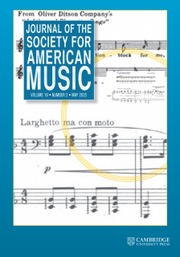Article contents
The Spirit inside Each Object: John Cage, Oskar Fischinger, and “The Future of Music”
Published online by Cambridge University Press: 20 February 2012
Abstract
Late in his career, John Cage often recalled his brief interaction with German abstract animator Oskar Fischinger in 1937 as the primary impetus for his early percussion works. Further examination of this connection reveals an important technological foundation to Cage's call for the expansion of musical resources. Fischinger's experiments with film phonography (the manipulation of the optical portion of sound film to synthesize sounds) mirrored contemporaneous refinements in recording and synthesis technology of electron beam tubes for film and television. New documentation on Cage's early career in Los Angeles, including research Cage conducted for his father John Cage, Sr.'s patents, explain his interest in these technologies. Finally, an examination of the sources of Cage's 1940 essay “The Future of Music: Credo” reveals the extent of Cage's knowledge of early sound synthesis and recording technologies and presents a more nuanced understanding of the historical relevance and origins of this document.
- Type
- Research Article
- Information
- Copyright
- Copyright © The Society for American Music 2012
References
References
- 7
- Cited by


